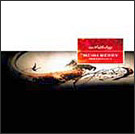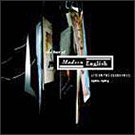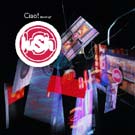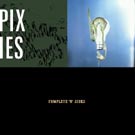 This year, 4AD's UK office has been reintroducing the public to thecatalogue of some of their former brightest stars. Heidi Berry'santhology "Pomegranate" gathers 14 songs from her three 4AD albums andadds a few extra bits. 4AD fans might not know her name but they sureknow her voice, as it's all over the final This Mortal Coil album,'Blood'. Her first album was released in 1989 but her first record for4AD, 'Love' was released in 1991 shortly after This Mortal Coil's'Blood'. 'Pomegranate' jumbles up her tracks in a non-chronologicalorder, with the basic folk-inspired acoustic songs interwoven withsongs with lush string arrangements and captivating swirling pianomelodies. There's something magical about that voice which shines invarious spots but can also get quite improperly placed when accompaniedby the Lost Girls in the collection's closer, "Needle's Eye".
This year, 4AD's UK office has been reintroducing the public to thecatalogue of some of their former brightest stars. Heidi Berry'santhology "Pomegranate" gathers 14 songs from her three 4AD albums andadds a few extra bits. 4AD fans might not know her name but they sureknow her voice, as it's all over the final This Mortal Coil album,'Blood'. Her first album was released in 1989 but her first record for4AD, 'Love' was released in 1991 shortly after This Mortal Coil's'Blood'. 'Pomegranate' jumbles up her tracks in a non-chronologicalorder, with the basic folk-inspired acoustic songs interwoven withsongs with lush string arrangements and captivating swirling pianomelodies. There's something magical about that voice which shines invarious spots but can also get quite improperly placed when accompaniedby the Lost Girls in the collection's closer, "Needle's Eye".  "Life in the Gladhouse" collects 16 album and single tracks from ModernEnglish between the years 1980 and 1984. While most people in the worldwill only credit them for the mega retro feel-good 80s anthem "I MeltWith You," the group had a much darker, angry and artful repertoirestretching over the course of three notable albums. Program the CD toplay the songs in chronological order and you can see how the groupcame into existence during the punk movement and exited during theearly 80s wave of new romantics. While I don't usually agree to "bestof" compilations from groups who only have three albums represented, acollection like this or Heidi Berry's will be helpful to people who arefamiliar with the small slice, but interested in hearing more. InModern English's case it's the big hit, only popularized long after itsinception, Heidi Berry's case being the voice of 'Blood.'
"Life in the Gladhouse" collects 16 album and single tracks from ModernEnglish between the years 1980 and 1984. While most people in the worldwill only credit them for the mega retro feel-good 80s anthem "I MeltWith You," the group had a much darker, angry and artful repertoirestretching over the course of three notable albums. Program the CD toplay the songs in chronological order and you can see how the groupcame into existence during the punk movement and exited during theearly 80s wave of new romantics. While I don't usually agree to "bestof" compilations from groups who only have three albums represented, acollection like this or Heidi Berry's will be helpful to people who arefamiliar with the small slice, but interested in hearing more. InModern English's case it's the big hit, only popularized long after itsinception, Heidi Berry's case being the voice of 'Blood.' "Ciao!,"on the other hand makes less sense. The group's popularity was muchstronger and to release a best of from a group also with a three-albumcareer like this is rather unnecesary. Unlike the past two collections,there is a chronological order executed here, in reverse however. Thedisc only grabs a few hits and some popular album tracks, heavy on thecatty most recent stuff (including the gratuitous Javis Crocker duetfrom 'Lushlife') and light on the beautiful two-girl harmonies onlayers upon layers of guitar wash, which captured everybody's attentionand love of the group in the first place. I fell in love with Lush'smusic over a decade ago and still hold much of their music dear to myheart, yet I'm not endorsing this collection. If they really wanted torelease a worthy retrospective, a collection of b-sides and compilationtracks would be wonderful. Over their short career, the group hasaccumulated an impressive non-album repertoire which couldn't fit onanything less than two lengthy compact discs.
"Ciao!,"on the other hand makes less sense. The group's popularity was muchstronger and to release a best of from a group also with a three-albumcareer like this is rather unnecesary. Unlike the past two collections,there is a chronological order executed here, in reverse however. Thedisc only grabs a few hits and some popular album tracks, heavy on thecatty most recent stuff (including the gratuitous Javis Crocker duetfrom 'Lushlife') and light on the beautiful two-girl harmonies onlayers upon layers of guitar wash, which captured everybody's attentionand love of the group in the first place. I fell in love with Lush'smusic over a decade ago and still hold much of their music dear to myheart, yet I'm not endorsing this collection. If they really wanted torelease a worthy retrospective, a collection of b-sides and compilationtracks would be wonderful. Over their short career, the group hasaccumulated an impressive non-album repertoire which couldn't fit onanything less than two lengthy compact discs. ThePixies were arguably one of the most influential bands of the late 80sand also arguably the last truly alternative band to gain recognitionon a large scale. They intelligently and almost accidentally combinedsmart riffs with surf-punk and abstract lyrics with hooks catchy enoughto make Lennon and McCartney jealous. In 1991, following the band'sfinal album, Nirvana fucked everything up, thrusting recycled Pixiesriffs repackaged as 'grunge' into the mainstream, merging 'alternative'and top 40 radio, forcing them all to cater to the new incarnation ofpop music. Thankfully it also surpressed hair bands, until thefollowing year when Pearl Jam surfaced as a repackaged Winger. I couldgo on for hours on the subsequent decline in individuality andextinction of daring record companies whose risk-taking was high andrewards were somewhat honorable, but that's another essay. That asidethis collection, 'The Complete B-Sides' doesn't do much more than itclaims, collecting all the singles tracks which didn't appear on thealbums, in chronological order from the start. Absent however are acouple lingering other tracks which appeared on compilations like'Rubyat' and 'I'm Your Fan: Songs of Leonard Cohen.' As a bonus acouple of their music videos are included - their breathrough hit,"Here Comes Your Man" and "Alison," which sadly enough omits the entirefirst part of the music video, "Dig for Fire." The commentary byCharlie Thompson (currently known as Frank Black, formerly known asBlack Francis) is short and direct, not surprisingly so as he's alwaysseemed to be more enthusiastic about current projects than reflectiveof his glory days in the Pixies.
ThePixies were arguably one of the most influential bands of the late 80sand also arguably the last truly alternative band to gain recognitionon a large scale. They intelligently and almost accidentally combinedsmart riffs with surf-punk and abstract lyrics with hooks catchy enoughto make Lennon and McCartney jealous. In 1991, following the band'sfinal album, Nirvana fucked everything up, thrusting recycled Pixiesriffs repackaged as 'grunge' into the mainstream, merging 'alternative'and top 40 radio, forcing them all to cater to the new incarnation ofpop music. Thankfully it also surpressed hair bands, until thefollowing year when Pearl Jam surfaced as a repackaged Winger. I couldgo on for hours on the subsequent decline in individuality andextinction of daring record companies whose risk-taking was high andrewards were somewhat honorable, but that's another essay. That asidethis collection, 'The Complete B-Sides' doesn't do much more than itclaims, collecting all the singles tracks which didn't appear on thealbums, in chronological order from the start. Absent however are acouple lingering other tracks which appeared on compilations like'Rubyat' and 'I'm Your Fan: Songs of Leonard Cohen.' As a bonus acouple of their music videos are included - their breathrough hit,"Here Comes Your Man" and "Alison," which sadly enough omits the entirefirst part of the music video, "Dig for Fire." The commentary byCharlie Thompson (currently known as Frank Black, formerly known asBlack Francis) is short and direct, not surprisingly so as he's alwaysseemed to be more enthusiastic about current projects than reflectiveof his glory days in the Pixies.
samples:
- Heidi Berry - Little Fox
- Heidi Berry - Cradle
- Modern English - Gathering Dust
- Modern English - Swans on Glass
- Lush - Lovelife
- Lush - Nothing Natural
- Pixies - Theme From Narc
- Pixies - Into the White
Read More

